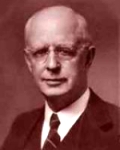|
MAJOR BIBLE THEMES
Dr.
Louis Sperry Chafer
*
|
"Bible doctrines are the bones of
revelation and the attentive Bible student must be
impressed with the New Testament emphasis on sound
doctrine (Matt. 7:28; John 7:16, 17; Acts 2:42; Rom.
6:17; Eph. 4:14; 1 Tim. 1:3; 4:6, 16; 6:1; 2 Tim.
3:10, 16; 4:2, 3; 2 John 1:9, 10)."
~ Dr. Louis Sperry Chafer ~ |
*
The studies presented
herein are a continuation
of Major Bible Themes which, Lord willing, will
eventually be presented
in its entirety. Major Bible Themes may serve as a wonderful outline for personal or group
Bible study.
Links to previous studies in the series may be found in our
Library.
~ editor ~
*
CHAPTER II -
THE BIBLE: INSPIRED OF GOD
and
CHAPTER III - THE
BIBLE: ITS SUBJECT AND PURPOSE
*
CHAPTER II
THE BIBLE:
INSPIRED OF GOD
All scripture is given by inspiration of God
~ 2 Timothy 3:16 ~
The Bible rightfully
assumes to be God's message to man. The books of the world
assume to be no more than man's message to his fellow-man. The
Bible therefore deals with things eternal, infinite, and
otherwise unknowable as freely as other books deal with things
temporal, finite, and known. In forming the Scriptures, it is
true that God employed human writers, but these men, though they
may have understood but little of the whole to which they were
contributing, did nevertheless, under the mighty hand of God,
produce a single Book in which there is infinite continuity and
which manifests every evidence of being the work of one Writer
who alone is its Author.
The true doctrine of inspiration contends that God so directed
the human authors that, without destroying their own
individuality, literary style, or personal interest, His
complete and connected thought toward man was recorded. Various
opinions have been advanced as to the extent of the divine
control over the human authors. These have been called "theories
of inspiration," and all students of the Bible should be clear
in their own minds with regard to these vital issues.
I. GENERAL THEORIES OF
INSPIRATION
1. Naturalistic. - This, as
the name implies, is the theory that the Bible is only a human
product and therefore void of any supernatural elements. This
view, which discredits and degrades the Word of God, is held
only by infidels and unregenerate men.
2. Partial. - By this term a theory of inspiration is indicated
which suggests that only certain parts of the Scriptures are
inspired. When this theory is accepted, of necessity each person
is left to determine for himself what portions of the Bible are
inspired and what are not. All authority is broken down since
people are not naturally inclined to receive and apply to
themselves those words of reproof and correction which are
contrary to their own wishes. Those who hold this theory usually
make much of the words of Christ as being more authoritative
than other portions of the Scriptures; disregarding the fact
that Christ wrote nothing and that His words are, at best, the
report of the very men whose writings they, in other
connections, discredit.
However, it should be remembered that Christ declared His own
acceptance of every word of the Old Testament to be the Word of
God, and that He provided for the full authority of every word
of the New Testament.
3. Gracious. - This theory of inspiration suggests that the
writers of the Bible were inspired in the same way, though to a
fuller degree, as Spirit-filled men are empowered today. The
writings of the Apostle Paul are said to be comparable with
the writings of John Calvin or
Martin Luther, and equally liable to be marred by human error.
This and the "Partial" theory of inspiration are the theories
which are held by Modernists today.
4. Verbal. - This theory, as its designation implies, maintains
that the Bible is, even to its very words, an inspired book.
This claim is made for the original writings only and not for
copies, translations, or quotations, even though they may date
back to the early days of the Christian era. However, though no
original manuscripts are now in existence, it is important to
observe that the most careful study of those copies,
translations and quotations which are available yields clear
evidence that our present text of the Bible is a very close
reproduction of the original.
It is sometimes claimed that it was not the very words but the
thought, or concept, which was inspired. The sufficient answer to
this suggestion is that, apart from the exact words, there could
be no precision in a mere conception, particularly such
precision as is demanded in the Scriptures. So, also, the
declaration of the writers who knew the facts is that they were
responsible for words rather than the mere concept (note Moses,
Exod. 34:27; David, 2 Sam. 23:2; Psa. 45:1; Solomon, Prov. 30:6;
Isaiah, Isa. 6:5-8; Jeremiah, Jer. 1:7; 36:1, 2; Zechariah,
Zech. 7:7; Christ, Matt. 8:17; John 14:10; 8:47; 12:48; 17:8;
Paul, 1 Cor. 2:4; Jude, Jude 1:17, 18: R.V.) Nor does the
Bible's own claim to be inspired, even in its very words, limit
the choice of words or the flow of style on the part of the human
writers, for God is abundantly able to secure the exact
expression He demands even within the literary limitations of a
fisherman.
II. THE
TESTIMONY OF CHRIST
Beyond its own claims, the
Old Testament was declared by Christ to be the inspired Word of
God. When He spoke, none of the New Testament had been written,
therefore He could have referred only to the Old Testament (John
17:17). Likewise, the New Testament was written according to His
provision and promise. He had said that He would leave a
revelation and that it would be completed after His departure
(John 16:12, 13). This revelation was committed to certain men
(John 15:27; Acts 1:8; Matt. 28:19; Luke 10:22), and He gave
their words the same authority as His own (Matt. 10:14, 15; Luke
10:16; John 13:20; 17:14, 18; Heb. 2:3, 4).
III. TWO
IMPORTANT PASSAGES
1.
All scripture is given by inspiration of God (2 Tim.
3:16). The word which is here translated inspiration is used but
once in the New Testament. It means "God-breathed," and,
according to this verse, this divine element extends to all the
Scriptures.
2. Holy men of God spake as they were
moved by the Holy Ghost (2 Pet. 1:21). The phrase,
moved by the Holy Ghost, is the vital element in this
revelation and its literal meaning is that the writers were
"borne along" by the Spirit of God. Such is the Bible's own
claim to inspiration.
IV.
QUALIFYING CONSIDERATIONS
1. Inspiration provides that
the exact divine message be given. If it is God's Truth which is
reported, it is recorded exactly. If it is Satan's lie, it is
presented as a lie, for inspiration does not change a lie into
truth. If it is history, it is true to the facts. If it is
prophecy, it indicates precisely what will come to pass.
2. Inspiration aims at inspired writings and not at inspired
men. The very infallible Scriptures themselves record the sins
and failures of the human authors.
3. Since we depend upon the Bible alone for the knowledge of the
most vital facts of our existence, there is every reason to
contend for the divine accuracy of God's Word and to be grateful
that it is God-breathed and
therefore not merely as fallible as its human writers, but is as
infallible as its divine Author.
QUESTIONS
1. Wherein does the Bible
assume to be God's message to man?
2. For what does the doctrine of Inspiration contend?
3. Define the Naturalistic Theory of Inspiration.
4. Define the Partial Theory of Inspiration.
5. Define the Gracious Theory of Inspiration.
6. Define the Verbal Theory of Inspiration.
7. Which of these do you accept?
8. Why is it that inspiration cannot be limited to the thought
or concept?
9. What theory of inspiration does the Bible claim for itself?
10. Indicate Christ's attitude toward the inspiration of the Old
Testament Scriptures.
11. What provision did He make for the inspiration of the New
Testament?
12. State the meaning of the word "inspiration" as used in 2
Timothy 3:16 and of the words moved by
the Holy Ghost as used in 2 Peter 1:21.
13. Indicate the effect of inspiration on the recorded words of
God, of Satan, of men, of history, and of prophecy.
14. Does inspiration aim at inspired men or inspired writings?
What proof can be given for your answer?
*
CHAPTER III
THE
BIBLE: ITS SUBJECT AND PURPOSE
"Since the Bible is God's message to man, its supreme purpose is
His supreme purpose; which is, that He may be glorified."
Revelation from God
is reasonable. In the presence of the fact of the material
universe, a belief in a sufficient Creator is demanded of all
rational beings. And, having recognized the Creator and man as
the consummation of creation, it is reasonable to expect that
the Creator will communicate with the creature, revealing His
purpose and will. God the Creator has done this having revealed
Himself in various ways:
1. Through Nature. - The eternal power and Godhead, we are told
are revealed by the things which are created (Rom. 1:20), but,
while the revelation is limited in that it discloses nothing of
those divine attributes which have to do with redemption and the
destiny of men, it is sufficient to the extent that the heathen
world is without excuse if they do not recognize that there is a
God.
2. In Christ. - In the fullness of time (Gal. 4:4), God became
manifest in the flesh. The Son of God came into the world to
declare God to men in terms of human understanding. By His
incarnation, otherwise inscrutable facts concerning the eternal
God have been translated into the limited range of human
comprehension. This revelation contemplates not only the Person
and power of God which was already set forth to a limited degree
in the things created, but more particularly the love of God as
set forth in the sacrificial death of Christ. Christ is an exact
portrait of God (Heb. 1:3), and we should always consider Christ
as God manifest in the flesh (1 Tim. 3:16).
3. The Written Word. - This chapter has to do with the written
Word as a manifestation. The Bible not only presents God as its
supreme subject, but also unfolds His purposes. The written
revelation is all-inclusive. It not only restates all the facts
concerning God which are revealed through nature, and gives the
only record concerning God's manifestation in Christ, but it
enlarges the divine revelation into infinite detail regarding God
the Father, the Son, the Spirit, angels, demons, man, sin,
salvation, grace, and glory. In recognizing the unique character
of the Bible, two things especially noted in the title of this
chapter may be emphasized:
I. THE
PURPOSE OF THE BIBLE
We understand from the
written Word of God that there is one supreme purpose which
actuates God in all He has done or will do from the beginning of
creation to the farthest reaches of eternity whether it is in
Heaven or on earth. For this one purpose angels were created;
so, also, the material universe and man, and, though hidden
behind an inscrutable mystery, we know that even sin was
permitted and redemption was provided with a view to the
realization of this supreme purpose. This supreme purpose is the
Glory of God.
That God should bring all things to pass that He might be glorified
would seem self-seeking to an infinite degree, from a mere human
view-point; but this theme cannot be limited to the range of
human conceptions. In the light of Scripture revelation, we
conclude that because God is infinite in His being, His
perfections, and His blessedness He is worthy of infinite glory,
and it would be an injustice of infinite proportions should His
creation withhold from Him that honor and glory which are
rightfully His.
God is not self-seeking; He who is the fountain source of all
truth must be true to Himself as Creator and Lord of all. It is
man who is self-centered and who can conceive of nothing more
desirable than that man should be exalted and glorified. It is
man who does not understand the normal relation which should
exist between the Creator and the creature, and does not ascribe
to the Creator that glory which is rightfully due Him because of
His person, His position, and His character (Exod. 24:10, 17; 1
Chron. 16:17-29; Psa. 57:11; Isa. 6:1).
Since the Bible is God's message to man, its supreme purpose is
His supreme purpose; which is, that He may be glorified. The
Bible records:
1. That all things ... that are in
heaven, and that are in earth, visible and invisible, whether
they be thrones, or dominions, or principalities, or powers: all
things were created by him, and for him (for his
glory, Col. 1:16). Angels and men, the material universe and
every creature, are all created for His glory.
The heavens declare the glory of God
(Psa. 19:1).
2. The nation Israel is for the glory of God (Jer. 13:11; Isa.
43:7, 21, 25; 60:1, 3, 21; 62:3).
3. Salvation is unto the glory of God (Rom. 9:23), even as it
will be a manifestation of the grace of God (Eph. 2:7), and is
now a manifestation of the wisdom of God (Eph. 3:10).
4. All service should be unto the glory of God (Matt. 5:16; John
15:8; 1 Cor. 10:31; 1 Pet. 2:12; 4:11, 14). The Bible itself is
God's instrument by which He prepares the man of God unto every
good work (2 Tim. 3:16, 17).
5. The Christian's new passion is that God may be glorified (Rom.
5:2).
6. Even the believer's death is said to be to this one end (John
21:19; Phil. 1:20).
7. The saved one is appointed to share in the glory of Christ
(John 17:22; Col. 3:4).
II. THE
SUBJECT OF THE BIBLE
The Lord Jesus Christ is the
supreme subject of the Bible. Like a glass this book reflects
the glory of the Lord (2
Cor. 3:18); but the Lord Himself has been manifested that He, in
turn, might reflect the glory of God.
For God, who commanded the light to shine out of darkness, hath
shined in our hearts, to give the light of the knowledge of the
glory of God in the face of Jesus Christ (2 Cor.
4:6).
QUESTIONS
1. On what ground is it
reasonable to expect that God would reveal Himself to man?
2. What passage of Scripture indicates that God has revealed
Himself to man through nature?
3. What concerning God is thus revealed?
4. Is nature's revelation complete?
5. By what means has God made a perfect revelation of Himself to
man?
6. Wherein is this revelation superior to that of nature?
7. Indicate the various aspects of the divine revelation as set
forth in the Bible.
8. What is the supreme purpose of God as revealed in the
Scriptures?
9. Why is it in no way self-seeking on the part of God to wish
to accomplish His own glory?
10. Wherein is real self-seeking disclosed?
11. Name seven ways which are indicated in the Scriptures
whereby God is said to be glorified.
12. Point out the Scriptures which state that all creation is
for the glory of God.
13. In what way is God glorified through the salvation of a soul?
14. Describe how Christ is the manifestation of God's glory.
*
|
Major Bible
Themes herein presented is its first edition
(copyright 1926), is in the public domain, and may be
freely downloaded in its entirety or chapter by chapter
at
http://www.spiritual-research-network.com/major_bible_themes.html.
Information for purchase
of the revised edition by John F. Walvoord (copyright
1974) may be found at the same address.
Dr. Louis Sperry Chafer (1871-1952)
was the founder of Dallas Theological Seminary, and from
1924 until his death, served as the its first President
and Professor of Systematic Theology. His
ground-breaking eight volume Systematic Theology,
first published in 1947-1948,
was the first systematization of a premillennial,
dispensational interpretation of the Scriptures.
|
*
Return to Home Page

|


